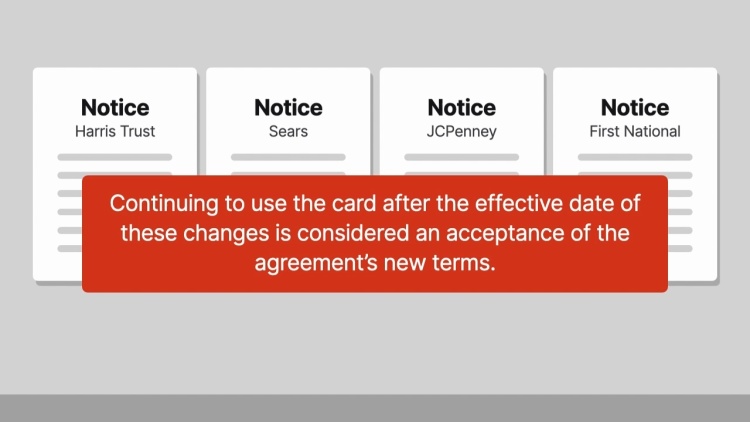Garber v. Harris Trust & Savings Bank
Illinois Appellate Court
432 N.E.2d 1309 (1982)
- Written by Jamie Milne, JD
Facts
Sheldon Garber and Gary Blank (cardholders) (plaintiffs) had, between them, credit cards from Harris Trust and Savings Bank, Sears Roebuck and Co., J.C. Penney Co., and First National Bank of Chicago (institutions) (defendants). In 1980, all four institutions notified cardholders of changes to their cardholder agreements, either increasing the minimum monthly payments, adding an annual fee, or imposing finance charges. Continuing to use a card after the effective date of a change was to constitute acceptance of an agreement’s new terms. Garber and Blank, on behalf of themselves and other impacted individuals, sued the institutions, arguing that the institutions had breached their respective cardholder agreements by unilaterally changing the terms under which they would extend credit. The cardholders argued that a binding contract was formed when the institutions issued credit cards to the cardholders and that the institutions were bound to continue to extend credit under the terms of the cardholder agreements. According to the cardholders, the defendants’ modifications to the agreements were void for lack of consideration. The cardholders sought injunctive relief and money damages. The institutions moved to dismiss, and the trial court granted their motions. The cardholders appealed.
Rule of Law
Issue
Holding and Reasoning (White, J.)
What to do next…
Here's why 907,000 law students have relied on our case briefs:
- Written by law professors and practitioners, not other law students. 47,100 briefs, keyed to 996 casebooks. Top-notch customer support.
- The right amount of information, includes the facts, issues, rule of law, holding and reasoning, and any concurrences and dissents.
- Access in your classes, works on your mobile and tablet. Massive library of related video lessons and high quality multiple-choice questions.
- Easy to use, uniform format for every case brief. Written in plain English, not in legalese. Our briefs summarize and simplify; they don’t just repeat the court’s language.





